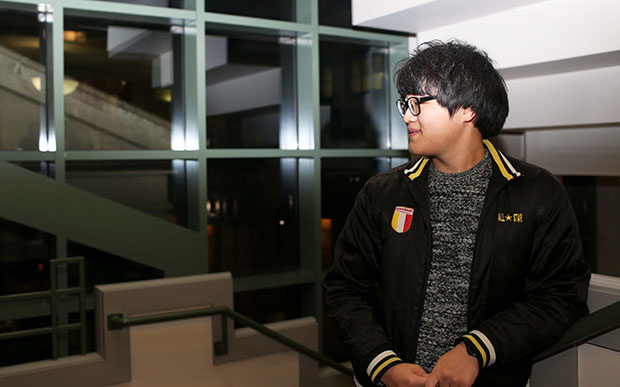By Li Dai, The Daily Iowan

UI student Seung Jin Lee, of South Korea, stands on the steps of the Pappajohn Business Building. Photo credit: Margaret Kispert, the Daily Iowan.
This May will again be the season of graduation, and students have been considering their plans for life after graduation. For international students, it can be an especially difficult time. They must decide whether stay in the United States, go back to their home countries, pursue more education, or begin to work.
Some international students face military conscription when they return home after graduation.
UI senior Dohee Park, a South Korean student, said he is really concerned about military service after graduation.
“I want to study more and go to a graduate school,” he said. “But I feel the military service is sort of blocking my way.”
Military service in South Korea varies by branch, but males must serve anywhere from 21 to 36 months after they turn 18 or finish their education.
Park said he can go back to the United States for graduate school if he goes to finish his military service in South Korea, but what he is concerned is that his English skills or what he learned during college would deteriorate while he is serving in the military.
“Twenty-one months is a long time; it could be a valuable time for me doing other things,” Park said. “Maybe getting a job or continuing my studies.”
UI student Cheong Choe said that every guy in South Korea worries about the military service because it takes years to complete and the time is long for young people.
“For two years, people can learn some foreign language or earn some certificates,” Choe said. “For example, women take an advantage because they do not go.”
“To compete with other people, soldiers would worry about their future because they feel like they are behind,” he said.
UI student Seung jin Lee said that he is thinking of serving the military (in South Korea) before graduation because of hierarchy and academic reason.
UI senior Yang Li of China, said she decided to go back to China after graduation.
“Even though I really want to stay in the United States to find a job, I have to go back to China because I am the only child of my family,” Li said. “I must be responsible to my parents.”
Because of China’s one-child policy, many Chinese students who study at UI are the only child in their families and have considerable responsibilities to their parents.
If they choose to stay here, some said, their parents would be very lonely, especially after their parents’ retirement.
“If I decide to stay here and leave my parents alone, I think it is selfish,” Li said. “So I have to give up my dream of finding a job in the United States.”
UI student Hae Won Hwang, who comes from South Korea, said she would like to go to graduate school in Korea.
“I know the quality of education is better in the Unites States, but I want to go back because I miss home,” she said. “As I am a senior and stayed in the U.S. more than three years, I am afraid I would get depressed if the life in the U.S. gets longer, but I am still considering going to U.S. graduate schools.”
Hwang said that if she stays in U.S., she would get stress more because of language barriers and homesickness.
“My English is getting better as I stay in U.S., but English is not my mother language,” Hwang said. “So it is still hard and challenging.”
Hwang said that if she goes back to her country, she would have her family and friends near her.
While some students choose to go home based on emotion, some try to stay in the United States because of economic crises in their countries.
Jonathan De Jesus, a UI senior from Venezuela — which is currently in an economic crisis — said he plans to work in the United States after graduation.
“Living in my country is becoming difficult,” De Jesus said. “I am trying to stay here for some years, so I can have a better future.”
De Jesus said it would possible for him to find a job with someone in his family.
“Even if I am able to find a job back home, it probably would not provide enough benefits to live comfortably,” De Jesus said. “With one of the highest inflation rates in the world, life becomes more expensive than what you can afford with your salary in Venezuela.
“My plan is to learn and improve with a career in the USA, so I can eventually go back home and use my knowledge to help my country move forward,” he said.
Lee Seedorff, the senior associate director of International Student & Scholar Services, said international students have a couple options once they graduate.
“Some students choose to immediately return home and take on a job in their home country,” Seedorff said. “Other students may choose to continue their studies in a new degree program, going on to a master’s or Ph.D. program.”
She said other students may choose to take advantage of special employment options that permit them to stay in the United States for a brief period of time after graduation in order to gain experience working in their field of study.
“At any given time, we generally have an average of 300 to 350 students participating in postgraduation training,” Seedorff said.